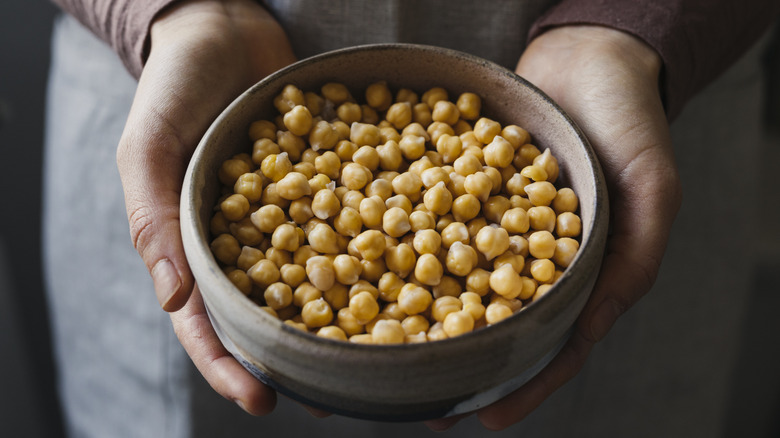Eat This High-Protein Food To Relieve Stubborn Headache Pain
Headaches can easily put a halt to any day. Whether you wake up with a nagging headache from dehydration or a searing migraine starts when you're trying to reach a deadline, you can't wait for your meds to kick in for relief. Your trigeminal nerve is responsible for your headache pain, according to the National Institutes of Health. The nerve starts in the base of your brain and branches around your skull to your face, neck, eyes, and ears. Nerve endings get triggered by stress, food, or medicine, and the trigeminal nerve tells your brain that something's amiss.
Different headaches require different treatments. People with migraines might need to take beta-blockers, calcium channel blockers, or antidepressants to treat their condition. Tension headaches might need triptan drugs, a heat compress, or physical therapy.
According to a 2020 article in Nutrients, headaches and migraines are often linked to not getting enough magnesium in your diet. Rather than reaching for aspirin or acetaminophen, adding some magnesium to your diet could be just as effective without the side effects of headache medication. You can turn to high-protein chickpeas to get a good amount of magnesium to provide some relief for headaches.
Low magnesium is linked to headaches and other disorders
Most of your magnesium is stored in your bones and soft tissues such as muscle, according to the 2020 article in Nutrients. Magnesium deficiency contributes to cortical spreading depression that is linked to migraines. Taking magnesium can help control headache pain, regulate blood flow, and dilate blood vessels. Magnesium can be particularly helpful for migraines with auras.
Magnesium plays a crucial role in the brain by preventing overstimulation of nerve cells. It also reduces inflammation in the body. People with neurological disorders like Alzheimer's and Parkinson's often have lower magnesium levels in the brain. Magnesium deficiency is linked to anxiety and stress in humans and mice. Using magnesium supplements might cause gastrointestinal side effects such as diarrhea. However, you can get magnesium from foods like chickpeas. A cup of canned chickpeas provides 37 milligrams of magnesium, which is about 10% of the recommended daily allowance for women and 9% for men.
Chickpeas have other health benefits
Aside from addressing magnesium deficiency, chickpeas are also packed with many health benefits, according to a 2023 article in Frontiers in Nutrition. The high-quality protein is readily absorbed and easily digestible by the body, and chickpeas have many of your essential amino acids to fight off free radicals. The peptides from chickpeas have been found to have anticancer properties in animal studies, and they might inhibit the angiotensin I-converting enzyme (ACE) to regulate blood pressure.
Even if you don't care to eat a bowl of chickpeas, remember that chickpeas serve as the base for hummus. According to a 2016 article in Nutrients, both chickpeas and hummus can keep your blood sugar under control because they both are low on the glycemic index. People who regularly eat chickpeas and hummus tend to have lower obesity rates, a lower body mass index, and a smaller waist circumference compared to others. Chickpeas may reduce total cholesterol and LDL cholesterol to improve your cardiovascular health. A cup of chickpeas gives you almost 10 grams of fiber to keep your gut healthy.



